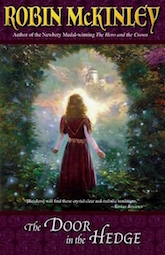The Door in the Hedge is a collection of four longish short stories, all reimaginations of fairytales, and first published in 1981. I must have first read it not long after that. Way back then, not many people were retelling fairytales, and the only other such book I’d come across was Angela Carter’s The Bloody Chamber. The Door in the Hedge isn’t that at all, and it’s interesting to think why not. They’re both unquestionably feminist reimaginations of the same kinds of European stories. But Carter was dragging her fairytales kicking and screaming and thrusting them bloody before us, while McKinley wants them still to be fairytales. Just… fairytales where the princesses have agency, where they are active and do things rather than having things done to them, but where they can still, after all, live happily ever after.
What McKinley has always been brilliant at is the kind of close up detail that make the lands of “once upon a time” feel solid. She’s not writing in real Medieval Europe or Hollywood Medieval Europe (as neatly parodied in Diana Wynne Jones’s Fantasyland); she’s writing out on the borders of Faerie, where there are tiny blue flowers and long gold ribbons and red cloaks that grow heavy when you pour drugged wine into them and where kings and queens retire into the mountains. Everything is very clean and nice and well organized and beautiful, except the evil things, which are ugly and will be properly defeated and put back in the box at the end of the story. In this universe goodness and nobility are real, and kings just naturally possess them. The stories are charming rather than dark. But isn’t that charm part of what we always liked about fairytales? These are like children’s stories, except that the people are real, and actions have consequences.
This isn’t “Seasons of Glass and Iron” or Grimm for that matter—these stories keep well away from the horror that lurks in fairytales. There’s a place where the traditional fairytale meets horror head on, and McKinley knows about that and went there in Deerskin. But Deerskin was ten years later, she wasn’t there yet, and neither were the rest of us.
It’s hard to remember, but when McKinley wrote these stories, princesses were not everywhere. It was before the Disney explosion, before little girls were deluged with pink sparkly princess tat. And McKinley was one of the first people to write empowered princesses. In one of these stories the princess saves the prince, and when I first read it in the early Eighties that was startling. We’ve come a long way since then, on a lot of fronts. That makes The Door in the Hedge seem a lot tamer. But part of the reason we have come a long way is because of books like this, because writers like McKinley brought us forward one step at a time, not always head-on into the unsettling but slowly, easing us along with charm and agency and little domestic details.
 I picked this book up again now because it was available as an e-book at a low low price that, as has become my recent habit, made me buy a copy of a book already on my shelves, so that I can reread it wherever I am. You need to have one for a while before you realise an e-reader is a re-reader’s best friend. Everything is with you all the time; if something reminds you of a book, the book is immediately to hand.
I picked this book up again now because it was available as an e-book at a low low price that, as has become my recent habit, made me buy a copy of a book already on my shelves, so that I can reread it wherever I am. You need to have one for a while before you realise an e-reader is a re-reader’s best friend. Everything is with you all the time; if something reminds you of a book, the book is immediately to hand.
The Door in the Hedge is a book from early in McKinley’s career, and not her best work. I had forgotten quite how princessy it is. All the same, reading it now, I found myself being charmed by it all over again.
Jo Walton is a science fiction and fantasy writer. She’s published a collection of Tor.com pieces, three poetry collections and thirteen novels, including the Hugo and Nebula winning Among Others. Her most recent book is Thessaly. She reads a lot, and blogs about it here irregularly. She comes from Wales but lives in Montreal where the food and books are more varied.










